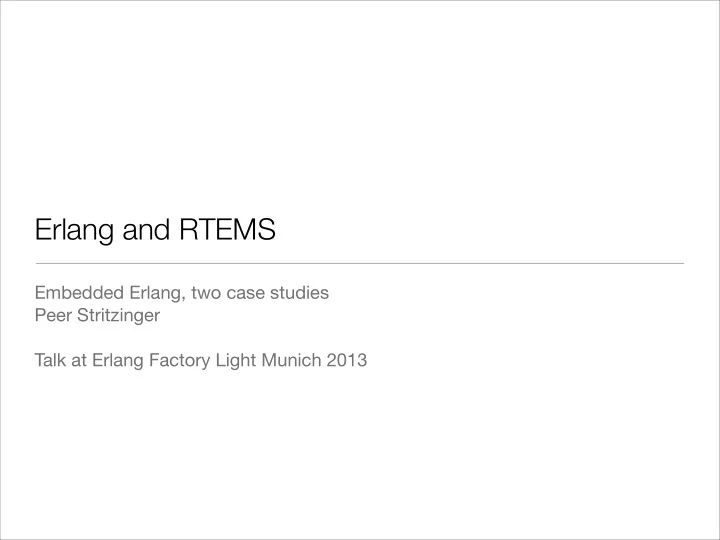

Erlang and RTEMS Embedded Erlang, two case studies Peer Stritzinger Talk at Erlang Factory Light Munich 2013
Outline • Case 1: Hydraprog-3, Reflashing system for Automotive "Embedded Control Units" (= ECUs) • Big picture • Erlang code structure • Lessons learnt • Case 2: Intelligent RFID Antenna • Porting Erlang on RTEMS (work in progress)
Automotive Protocols • LIN ✓ • LS-CAN ✓ • HS-CAN ✓ • FlexRay ✓ • MOST ✓ • OABR (Ethernet with special Phys. Layer) (... in development) • APIX1+2 ✓ - Ethernet via APIX (... in development)
Automotive Protocol Properties • Flash process in most cases defined over Diagnostic protocol • Ping-Pong protocol => latency issues • Mapping to lower level: usually bursty with timing/buffer negotiations • realtime requirements: semi-hard-realtime to really-hard • Big variety of link and physical layers
Gateways Gateways Mainboard custom custom Mini ITX Freescale Freescale Intel Atom MPC5517 MPC5517 FreeBSD, Erlang RTEMS RTEMS Ethernet USB USB Ethernet Switch / USB Hub
FreeBSD • Boots from read-only CF-card partition • 2 Partitions for upgrade • Partition for config storage copied to /etc in ramdisk • Extra partition for logging • Built with NanoBSD script
Erlang • Runs as much of the automotive protocols as possible • Protocol layers stackable by user config • Uses libusb in a port to talk to the gateways • USB bus is scanned regularly • Supervised protocol stacks are started for each gateway
Distributed Device • Multiple devices self network • Behave like one device with more channels
RTEMS • Hard-Realtime embedded executive • Small core with several APIs • Posix API • TCP/IP stack • Several schedulers
RTEMS cont. • About the same age as Erlang • Also very robust • Runs in many satellites and planetary probes • Industrial and Automotive applications • Great support in Europe: www.embedded-brains.de
RTEMS in Hydraprog-3 Gateways • Gets commands and data packets from USB • Controls and switches power to the connected ECUs • Protocol parts that require hard realtime or low latency • Talks to Low-Speed CAN, High-Speed CAN, FlexRay, MOST, LIN • Controls the display LEDs
Talking to (internal) USB Devices • C executable + libusb via port • Easy error handling • Problem: USB device enumeration doesn’t tell you what is where • Solution: Id + Serial number + Hw-Config file • Also: USB is weird • But bulk endpoints are easy once they are established
USB Hot-Plugging gateway_sup scan_usb temporary sup sup sup transient worker worker worker
Gateway queue handling usb_mux Gateway control control eeprom ls_can eeprom power usb ls_can usb_port power libusb-port.c
Protocol Layer Plumbing • Dynamic configuration during startup • Minimize latency • Differing state requirements • Stateless -- encoders/decoders • Configuration state • Runtime state
Example: MOST Stack devnull autosar_nm codec_can uds_most most_high most_nwm most codec_most most_msgs {inic_ctrl} most_tmm usb_mux codec_most most_seg inic most_msgs {moco_ctrl} codec_most most_msgs {moco_hbi}
Example: MOST Stack • Dynamic config: DAG like combination of modules [[[uds_most, most_high, most_nwm, most, most_tmm, most_seg, inic, [[most_msgs, {codec_most, [inic_ctrl, simple]}, {usb_mux, ['Usb_mux', inic_ctrl]}], [most_msgs, {codec_most, [moco_ctrl, simple]}, {usb_mux, ['Usb_mux', moco_ctrl]}], [most_msgs, {codec_most, [moco_hbi, simple]}, {usb_mux, ['Usb_mux', moco_hbi]}]]], [devnull, autosar_nm, {codec_can, []}, {usb_mux, ['Usb_mux', hs_can]}]]]}
Protocol-Stack config and Flash-Data Distribution Data Logs
Signed Autoexec Erlang App *.h3x *.zip signed & encrypted Auth keys User Data Erlang app + Script config extra modules
Scripting "language" • Re-used Erlangs parser • Interpreting the abstract syntax • Different, domain specific semantics
Reducing Latency • Send - Expect Engine in Gateway • Complicates protocol implementation • Enables streaming + optimal performance • Libusb support as port driver • High stability requirements • Initially on separate nodes
Lessons Learnt • Use gproc next time right away • Startup was messier than it needed to be without it • Use Quickcheck for testing right away • Start doing OTP Releases earlier
Erlang and RTEMS in Hydraprog-3 • Collaborates on different CPUs • Best of both worlds • Solution for larger devices • More on http://www.stritzinger.com
What about Hard Realtime? • Erlang has very good soft realtime responsiveness • Embedded applications often need hard realtime • Erlang alone can't do this • Especially on "normal" operating systems • Usually only small part required to be hard realtime
Erlang Running on RTEMS • Small embedded system • Only a small communication controller • Freescale MPC8309 • Still want best of both worlds • RTEMS Posix API has almost everything Erlang needs
Porting Erlang to RTEMS • Work in progress, at the moment (Feb 2013) • Erlang shell on RS232 console • Linked in drivers • Cross-built with otp_build using RTEMS build tools • RTEMS gets linked as a library • File access on target via NFS
In Progress • Get distribution working (epmd needs porting or faking) • Build Erlang as loadable application with new RTEMS Linker • Threads for async I/O • Support for NIFs with new dynamic linking support • Adding kqueue support to RTEMS
Future • Support for some RTEMS primitives from Erlang • Get all necessary patches back to RTEMS and OTP • Have a documented standard way to build Erlang/RTEMS • Once RTEMS gets stable SMP , support it from Erlang
Questions • Contact: peer@stritzinger.com • Twitter: @peerstr • IRC: peerst
Recommend
More recommend